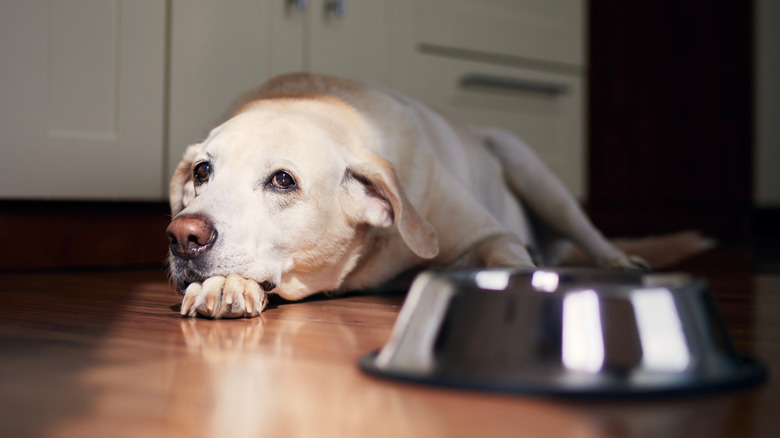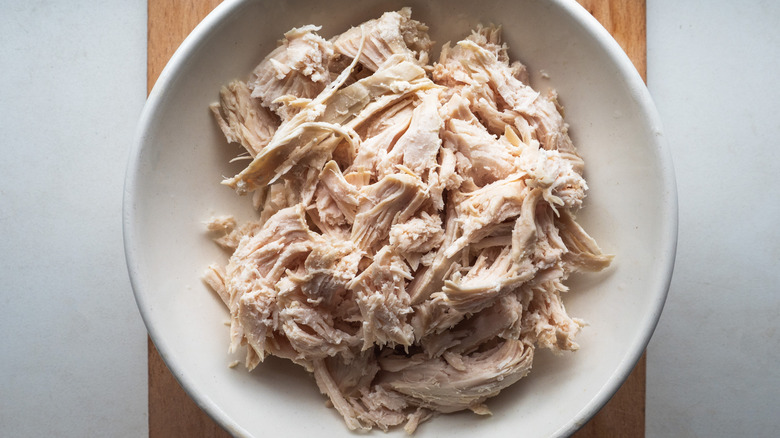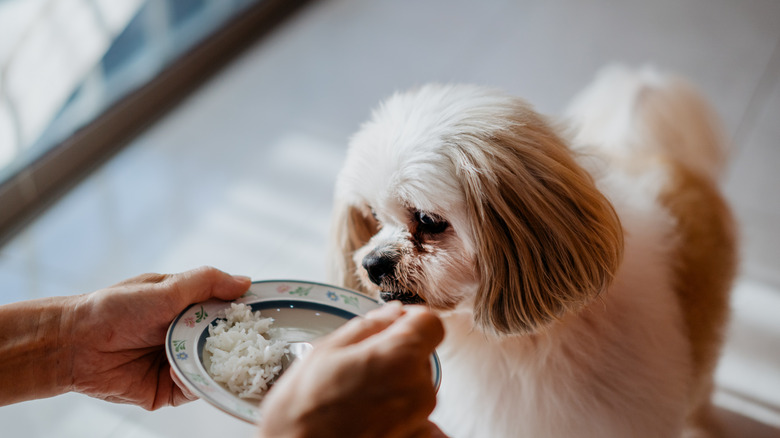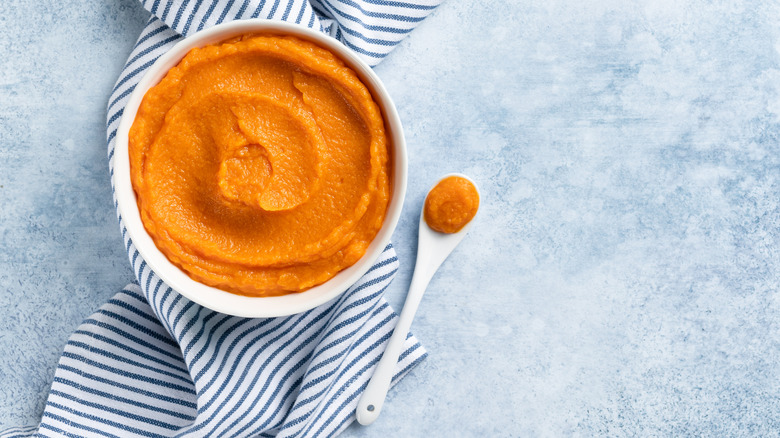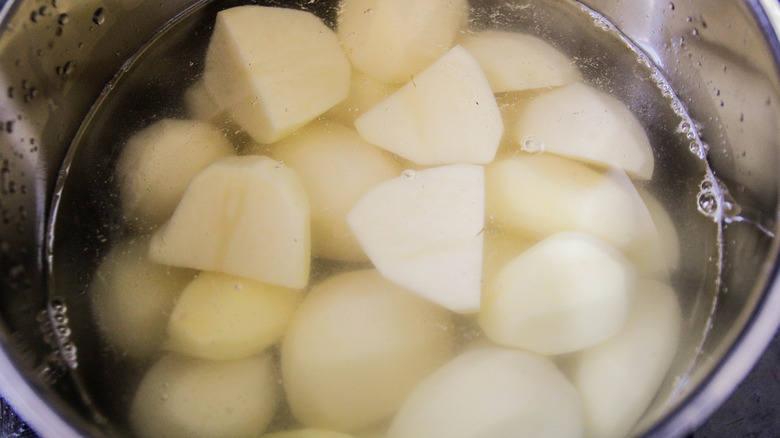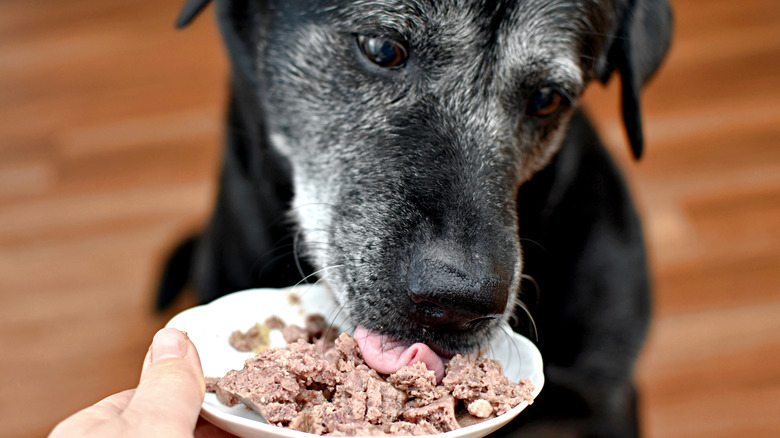5 Foods Your Dog Can Eat After They Have Diarrhea
It's never fun when your pup has an upset stomach and diarrhea. If you're concerned about your poor pup's condition, especially if they're vomiting and/or lack an appetite, consult your vet for the best next steps. If your dog is on the mend from a bout of diarrhea and you're just trying to get their stomach back to normal, there are a handful of home remedies, mostly foods that are bland and could be helpful in the healing of their digestive systems.
However, it's important to know that for most healthy dogs, the first recommended step for recovering from an upset stomach is usually to fast for between 12 and 24 hours, per PetMD. Whether this is appropriate for your pup will be up to your vet, but fasting allows your pup's system to clear out and gives it time to rest and recover. Once they no longer have diarrhea, it may be advisable to start serving them small quantities of bland food to help them ease back into eating. Below are five foods that are generally easy on a pup's sensitive stomach. As always, consult with your vet before serving.
Boiled chicken or ground beef
Unseasoned boiled chicken or ground beef is a great way to get your depleted pup some protein without upsetting their stomach. Boil plain, boneless, skinless chicken or ground beef in water, then pour off the water (and let it cool!) before serving to your pet. You'll want to start with small amounts — up to a couple of tablespoons — several times a day instead of two larger meals.
Now, proteins, including chicken and beef, are some of the most common allergens in dogs, so it's best to make sure your pup isn't allergic before serving them for an upset stomach (though that might not always be possible). As with any food you feed your pup after a bout of stomach upset, watch carefully to make sure they tolerate the small meals well before giving them more. Usually, when you serve your pup a bit of shredded boiled chicken or beef, you'll want to pair it with our next suggestion.
White rice
When feeding dogs rice, white rice is preferable to brown because it has more starch, which is helps heal the tummy. Prepare rice for your pup by boiling it in plain water, and don't add flavor enhancers like salt, butter, or oil. Ideally, you'd be able to mix rice with either boiled chicken or beef at a 2 to 1 ratio, per Ardmore Animal Hospital. For example, you might give your pup 4 tablespoons of white rice mixed with two tablespoons of ground beef.
You want to be careful about how much rice you feed your dog because white rice has a high glycemic index number, meaning that it could raise your dog's blood sugar levels. If your dog has diabetes, you'll want to double-check with your vet before serving it to them.
Pumpkin
Pumpkin is often touted as a miracle food for dogs, and for good reason. It's high in fiber, which helps regulate the digestive system, and it's rich in vitamins and minerals. Plain canned pumpkin actually has a higher concentration of nutrients compared to fresh pumpkin, so that's the best option for your pup. Just make sure you're not purchasing pre-seasoned and sweetened canned pumpkin pie filling – look for a can where pumpkin is the only ingredient listed.
If you're wondering how to feed your dog pumpkin, you can add between 1 and 4 tablespoons of pumpkin to your dog's meal depending on their size, according to the American Kennel Club. It could be good to add pumpkin to your dog's food when you start reintroducing it in small amounts during their recovery.
Potatoes
Like rice, white and sweet potatoes are starches that could help your pup's system recover since they're easy to digest. However, you never want to serve raw potatoes, as they contain solanine, a chemical that could be harmful to dogs. Peel them, then thoroughly cook the potatoes in boiling water before mashing and letting them cool.
As always, serve potatoes in small quantities as you monitor your dog's recovery. Like white rice, white potatoes are considered a high glycemic index food, so keep that in mind if you have concerns about your pup's blood sugar. Sweet potatoes are slightly have a slightly lower glycemic index, and boiling potatoes in general is a helpful way to keep the glycemic index lower, as that number is dependent on the preparation method.
Prescription dog food
For an acute instance of an upset stomach, your vet may prescribe a short regimen of bland, prescription food to get your pup back on their feet. If your dog has chronic diarrhea or ongoing digestive issues, your vet may prescribe a food specifically designed for dogs with these issues that they can be on long-term. Maybe your pup has an allergy or intolerance to a common dog food ingredient. In these cases, talk with your vet to find the food that your dog likes that won't mess with their digestive system.
Diarrhea is a common problem in dogs, and it happens for a variety of reasons. The best course of action is to work with your vet to find the cause of the problem and a solution that works for your furry friend — it won't be the same for every dog.
